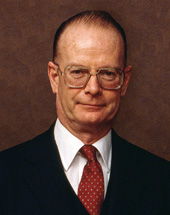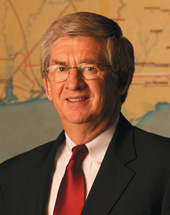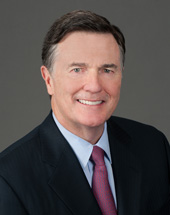From 1989 to 2013, the Atlanta Fed prospered under the skillful stewardship of three chief executives, each with a unique brand of leadership and a different set of forces with which to contend. Throughout the Atlanta Fed's 100-year history, each leader has left a distinct legacy while also building on the successes of his predecessors.
The Forrestal years (1983–95)
Robert Forrestal's tenure spanned a period of profound change in the banking industry and the economy, including a wave of financial deregulation, serious financial crises, and the recession in the early 1990s.

An attorney by trade, Forrestal was described as an intellectual and gracious leader. He was deeply interested in the world beyond U.S. borders, a fascination that often echoed in his speeches and research interests.
In an address to staff at the beginning of the 1990s, Forrestal pointed to a number of global challenges that would affect the Bank's work in some way. Indeed, events such as Europe 1992, a program that aimed to further the economic integration of Europe; political and economic changes in Eastern Europe and the former Soviet Union; and developing-economy debt issues would "propel major changes in the economy and the financial industry," he wrote.
Although Forrestal's legacy extends throughout the Atlanta Fed, it is perhaps most evident in the research department. Under his leadership and with a staff of highly accomplished economists, the department gained System-wide recognition for its work in groundbreaking areas such as financial market innovation and in more traditional topics like industry. Forrestal counted this accomplishment, along with efforts to internationalize the Bank and add more women and minorities to its leadership, among the key milestones during his tenure as president.
Guynn builds new headquarters, legacy (1996–2006)
With 42 years of service to the Atlanta Fed—10 years as president and 12 as first vice president—Jack Guynn had the longest tenure of any president.

Guynn was known as a down-to-earth, honest communicator. A self-described engineer by training, temperament, and—at least initially, profession—Guynn's background gave him a unique perspective on the financial and economic trends of the day. Globalization and technology were advancing at breakneck speed, bringing with them sweeping changes in the nation's financial system and the payments industry. And as technological transformations took hold at the Atlanta Fed, Guynn helped usher in new automation and communication tools—including the Internet and the Bank's intranet, to name a couple.
Standing at the corner of Peachtree and 10th streets, the Bank's Atlanta headquarters is perhaps Guynn's most visible legacy. The building's completion in 2001 was the culmination of years of planning. Importantly, the new building was designed to be open to the public—another lasting hallmark of Guynn's tenure. Indeed, under his leadership, the Bank deepened existing relationships and forged new ones with business, education, and government leaders in the region as well as with staff.
Lockhart leads into next 100 years (2007–2017)
As the Atlanta Fed marked its centennial in 2014, it was under the leadership of Dennis Lockhart. The former bank executive and college professor took the helm in 2007, bringing with him a wealth of private-sector and international experience.

Lockhart guided the Atlanta Fed through some of the biggest challenges in its 100-year history: a severe housing and financial crisis, the deepest and longest recession since the Great Depression, and a painfully slow recovery. Further, the Fed's unprecedented response to the nation's economic and financial woes exposed the U.S. central bank to intense political and public scrutiny.
Lockhart brought a businessman's perspective to these challenges and worked to tell the Atlanta Fed's story more broadly. Under his leadership, the Bank expanded its corporate citizenship efforts, carved out a new role for its five branches, and positioned the institution as a thought leader on key issues such as retail payments risk, labor markets and inflation, and more. Lockhart's legacy continues to grow as the Atlanta Fed heads into its second century.



